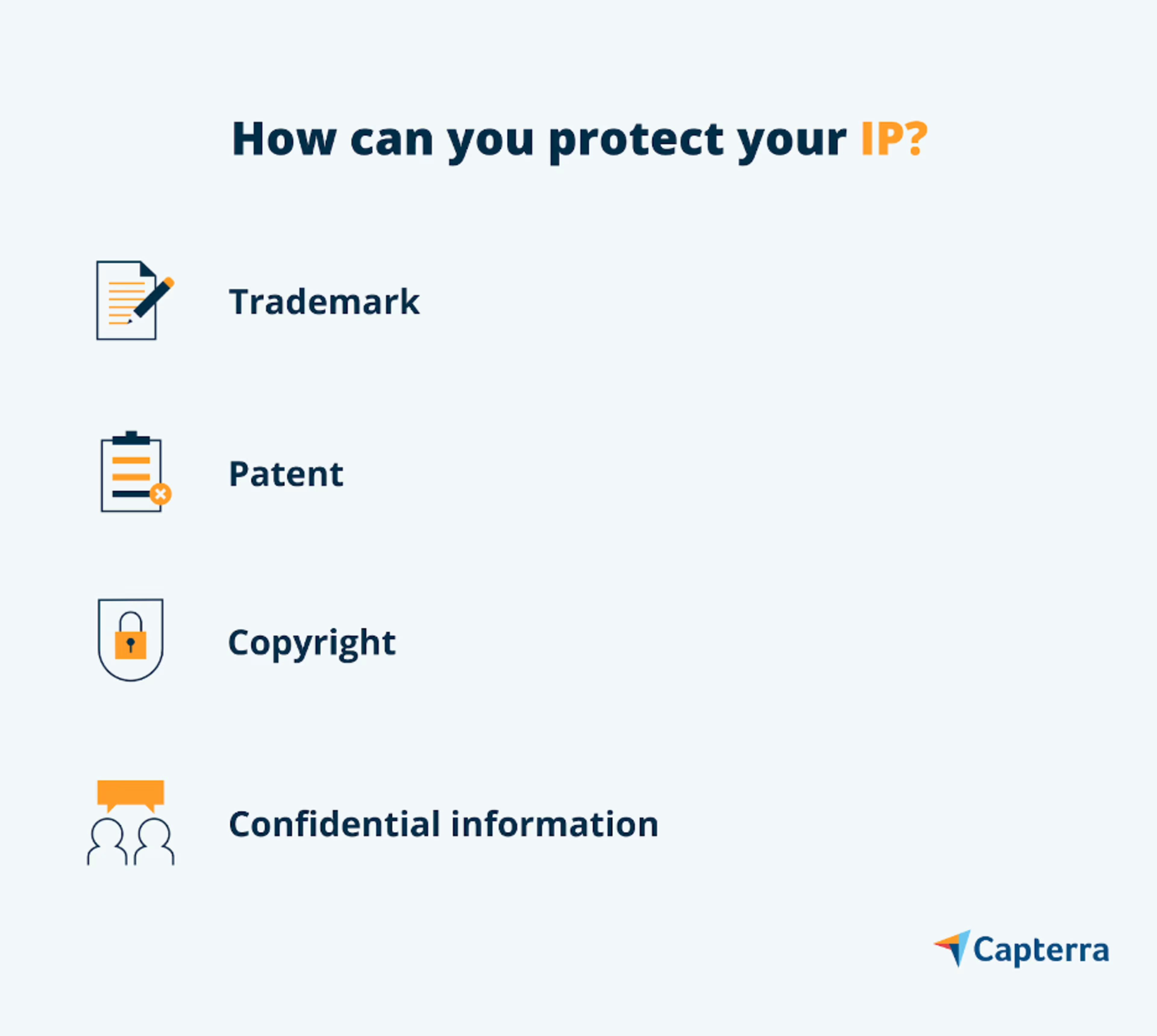Learn how intellectual property applies to your business and why it’s essential to protect it.
NOTE: This article is intended to inform our readers about business-related concerns in the United States. It is in no way intended to provide legal advice or to endorse a specific course of action. For advice on your specific situation, consult your legal counsel.
Did you know that intellectual property theft costs the US as much as $600 billion every year? And it’s not just big corporations or government institutions that are targeted. Even small businesses feel the brunt of IP theft, and they’re far more vulnerable to the damage it causes.
Based on the enormous costs, it’s easy to see that protecting your business’ IP should be a priority, no matter what the size or scope of your venture.
Intellectual property (IP) is a legal term that covers a range of aspects of a business. IP can be something physical, or it can be intangible concepts that you've created. It’s essentially the elements of your venture that have been designed or developed, that make the business you own unique.
Because it’s part of what makes your business unique, it’s essential that your IP is properly protected. It’s the cornerstone of how you market your company, the foundation on which you’ve established your reputation, and possibly even why customers choose your business over a competitor.
Without proper protection, other companies can use your IP to their advantage, potentially taking away your unique selling proposition (USP).
What is your intellectual property?
Your intellectual property is something unique to your venture, such as a new product on the market. For example, perhaps you’ve created a new type of hard-to-scale security fence, or designed a brand-new type of bicycle that the business you own will sell. This product that only your business offers sets you apart from others selling something similar.
IP can also be more intangible, such as your business model. If you’ve revolutionized how people order fast food or are selling sunglasses in a way that no one else is, that methodology and practice is your IP. The way you sell is your USP, not what you’re selling. Customers will choose you for the experience rather than just the product.
Your IP includes elements such as your company name, logo, and slogan. It even covers your corporate identity (CI), which includes fonts, colors, and the way you brand your business. If another company uses something too similar to your CI, especially if they’re a direct competitor, you could lose sales because of customer confusion.
How can you protect your IP?

There are many legal ways to protect your IP and ensure no other business can take your concepts or products and use them. The way you protect your business's IP will depend on what it is, and which laws it falls under.
1. Trademark
This is the most common type of IP protection for businesses. You can cover your entire CI through a trademark, including your company name, the design of your logo, and the way you brand your business. It can be tricky to trademark a slogan if the words or phrases are common in everyday speech, but it’s worth investigating if you think it’s unique to your business or industry.
If you have a particular product that you’ve designed or created, you can trademark the name and logo used for that product, too. This prevents people from copying the product and using the same name to potentially confuse customers.
2. Patent
A patent protects an invention. This covers the products or tools that your business has specifically designed and built. By using a patent, you’ll be able to prove that you invented the product you’ve made to sell or use as part of your business and that you’re the only one with the exclusive right to use it.
The invention doesn’t have to be unique for you to obtain a patent. However, you do have to show that you’ve improved upon the design of an existing concept, or done something to make your version unique. For example, you could patent a concept and plans for a new external hard drive for a computer or a new pair of running shoes. These products exist, but your particular plans are your own, and possibly superior to the other patents on those products.
3. Copyright
Copyright comes into effect in artistic fields to protect the works of painters, writers, musicians, and composers. You can place a copyright on a poem, novel, film, a piece of music (both written and a particular recording), a painting, or sculpture. These types of works belong to the person who created them, and the copyright allows them to claim ownership should someone else want to use the artwork for their business.
4. Confidential information
If there’s something about your business you want to keep secret from competitors, you can protect the information under this legal framework and should an issue arise, the law protects your interests. Confidential information can be anything from your business plan to your marketing strategy. It can also include your business process and internal software, or procedures that you use to make your business unique.
IP protection in practice
Prevention is definitely better than cure, so the saying goes. This also applies to looking after your IP. It’s much better to have protection in place beforehand than having to defend your right to your IP once an incident occurs.
Ensure documentation is up to date: The most important thing to do is ensure that you have all of your IP documentation in order and that it gets updated whenever related changes occur in the business. Out-of-date IP documentation will not protect you if someone tries to copy your work.
Use NDAs for employees: Threats to your IP can come from anywhere, including your employees. If you have proprietary strategies or procedures in your business, it’s essential that you include a protection clause in all employee contracts. This includes a non-disclosure agreement (NDA) that covers the period of employment, and for a defined period after they are no longer with the company. You should consider using this kind of agreement if you have any products, hardware, or software that you use as part of your operations that you do not want other companies to find out about.
Use NDAs with third-parties: Remember, if you’re looking to secure necessary funding from a bank or investor, you can request that an NDA be in place before presenting your concept or product. It’s always good to be able to tell the person giving you money what makes your company unique, but it’s not advisable to give away trade secrets in the process.
With the costs of IP theft already being incredibly high it just makes sense that as a business owner, you protect your interests. Doing so could be the difference between success and becoming a statistic.
Are you interested in becoming a guest writer for Capterra? Reach out to guestcontributors@gartner.com for details.
